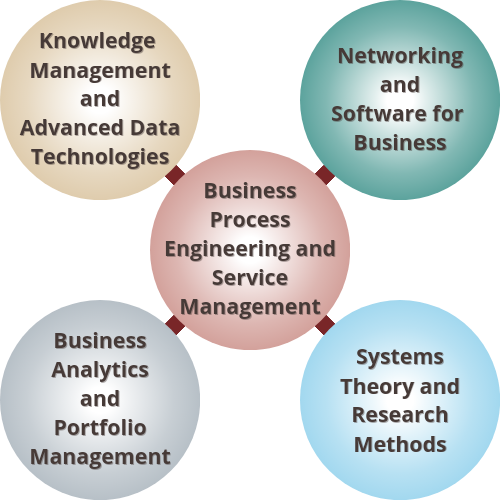In the study programme “Business Informatics” (total 120 ECTS), 57 ECTS are allocated for compulsory study courses, 27 ECTS to compulsory limited choice study courses, 6 ECTS to free choice, and 30 ECTS to the Master Thesis.
There are three types of courses: ICT study courses (for example, Advanced Data Technologies), Business study courses (for example, Business Ethics), and integrated study courses (for example, Business Process Management and Engineering). Each course has clearly defined learning outcomes and evaluation mechanisms. Various business and ICT issues are integrated into the program at the level of the program and at the level of individual courses. A course can be viewed as a module and the program is considered as consisting of several larger granularity models that amalgamate courses by themes and concentrations.
Studies in Business Informatics include lectures given by an exclusive team of academic and business professionals. Besides, each course contains practical/laboratory assignments for practical use and development of advanced ICT solutions. Group work and individual assignments are carefully balanced to develop interpersonal, self-dependence, decision- making, and leadership skills. Students are assessed by the quality of their work during the semester and the results of examinations in each course.
The final examination procedure includes the development of a Master Thesis (30 ECTS). The Master thesis is the author’s original research, where methods, models, techniques, and prototypes applicable for solving tasks in the field of business informatics are analytically or experimentally assessed and/or integrated and/or designed. The purpose of the Master Thesis is to give students an opportunity to apply their knowledge and skills in the field of scientific research in order to gain a firm foundation for post-graduate studies; to further develop their competence in decision-making, problem identification, analysis, and solving, as well as to promote creativity and sharpen professional discussion and presentation skills proving their ability to accomplish scientific research and discuss it at a high professional level.
The learning outcomes of the Master Thesis (as the outcomes of all study courses) are evaluated according to the 10 grade (10 – the highest) system according to Regulation on the Assessment of Learning Outcomes of RTU (29 May 2017, Minutes No 610).
Studies are in English. They are scheduled in the evenings because most of the students (including international ones) are employed by Latvian companies.
Local and international students study together in the program. The enrolment to the program occurs in summer and in winter. Full-time students of the summer intake have Master Thesis as a separate semester in their study plan to facilitate their mobility. Part- time and winter intake full-time students can develop their Master Thesis more gradually.
There are
full-time (2 years of studies: with admissions in spring and autumn) and
part-time (2.5 years of studies with an intake in autumn) studies available (for more information please see
here) as well as it is possible to combine continuing education and regular studies (3 or more years long study process, but it could be 20+% expensive).

